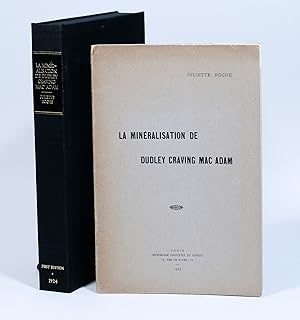Beschreibung
FIRST EDITION of Roche's surreal, dadaist roman à clef exposing the misogynistic world of the French avant-garde. With annotations likely in Roche's hand. Like too many women artists of the early twentieth century, French writer and artist Juliette Roche (1884 - 1980) has been long overshadowed by her male contemporaries. Roche came of age amidst leading artistic and literary salons of early 20th century Paris. She studied at Académie Ranson, then considered the absolute best art school in Paris, and was an early adopter of Cubism. However, she is most closely associated with Dadaism. Despite Dada being a movement of absolute rebellion it harbored the normalized misogyny of the early twentieth century. Roche's most explicit critique of this discrepancy, of rebellion vs repression, can be found in La Minéralisation de Dudley Craving Mac Adam, her groundbreaking novella. Part satire and part Dada nonsense, the thinly veiled roman à clef is a prime example of the daring poetic style that Roche developed while living in New York during World War I. Having watched artistic vanguards come and go in Paris' salons and exhibitions, Roche observed the New York City hijinks of Francis Picabia (French, 1879 - 1953) and Marcel Duchamp (1887 - 1968) with a level of detachment that alluded their American peers. She had close access to Picabia, perhaps too close: in 1917 he and his wife, Gabrielle Buffet-Picabia, moved into an apartment directly beneath one Roche shared with her husband Albert Gleizes, a French artist and philosopher who helped popularize Cubism, on the Upper West Side. While Roche admired Picabia's iconoclasm she was disturbed by the misogyny she saw in works like his manometres where woman as 'la machine' was at best a manipulable object, at worst the butt of a private joke. If taking Roche's ambivalence towards and her neighborly proximity to Picabia into consideration, the novella could be inspired in part by an age-old story: pure contempt of one's neighbor. The novella is an indirect indictment of certain illicit behaviors Roche found annoying and dangerous. She synthesizes her fellow expatriates' personalities and physical traits to create the decadent Mac'Adam and the men he encounters on the day of his demise. Picabia becomes Mac'Adam. Swiss writer and boxer Arthur Craven (1887 - 1918) lends his name to the protagonist while becoming Lloyd Willow. Juliette Roche herself appears as Juliette Granite, a play on words since roche means rock in French. Roche spins the narrative in poetic and surreal fragments, at turns absurd and others told in a stream-of-consciousness style. La Minéralisation moves beyond conventional storytelling to allow readers into the minds of her characters through rich interior monologues, revealing in each case her estimation of the particular model's idiosyncrasies. Roche seemed to find the antics of the all-male world of the Dadaists to be too limited, and they're wickedly satirized among these pages. Written in ink on the first page is "Publié dans 'La Vie des Lettres' en 1921 / New York 1918" and there are a few words written on page 20 in the same hand. It appears to be Roche's handwriting (from the few samples we've seen), but we can't guarantee it. Paris: Imprimerie Croutzet et Depost, 1924. Thin octavo (33pp + terminal blank), original printed wrappers, stapled (as issued); custom box. Small tear and split at top of spine; a near-fine, extremely well-preserved copy. EXCEEDINGLY RARE: We can find records of no other copies that have been on the market. References: Burke, Carolyn, "Recollecting Dada: Juliette Roche." Women in Dada: Essays on Sex, Gender, and Identity, edited by Naomi Sawelson-Gorse, MIT Press, 1998, 557. Bestandsnummer des Verkäufers 2729
Verkäufer kontaktieren
Diesen Artikel melden
![]()




